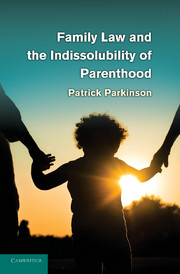Book contents
- Frontmatter
- Contents
- Preface
- PART ONE Family Law and the Meaning of Divorce
- 1 Family Law and the Issue of Gender Conflict
- 2 The Divorce Revolution and the Process of Allocation
- PART TWO Parenthood in the Enduring Family
- PART THREE Parents Forever?
- PART FOUR The Family Law System and the Enduring Family
- PART FIVE Financial Transfers in the Enduring Family
- PART SIX The Future of Family Law
- Index
- References
1 - Family Law and the Issue of Gender Conflict
Published online by Cambridge University Press: 01 March 2011
- Frontmatter
- Contents
- Preface
- PART ONE Family Law and the Meaning of Divorce
- 1 Family Law and the Issue of Gender Conflict
- 2 The Divorce Revolution and the Process of Allocation
- PART TWO Parenthood in the Enduring Family
- PART THREE Parents Forever?
- PART FOUR The Family Law System and the Enduring Family
- PART FIVE Financial Transfers in the Enduring Family
- PART SIX The Future of Family Law
- Index
- References
Summary
FATHERS, MOTHERS, AND THE GENDER WAR
Family law is largely about distributing loss. Of course, it is rarely described as such. When judges make decisions about where children will live and how much contact the other parent will have, their decisions are cloaked in the optimistic language of the “best interests” of children. Similarly, when making decisions about property, courts may use the language of equitable distribution of assets, as if what is being divided are the gains of the marriage. In one sense it may be so. Yet in divorce, as is often said, there are no winners. When it is not possible for the children to live in the same household with both parents, neither parent will usually have as much time with the children as he or she had during the intact marriage. When one household is divided into two, neither party to the marriage can keep as much of the property as they enjoyed during the marriage. The courts must endeavor to split the loss equitably between them.
Because marriage breakdown involves so much loss, it is also a period of grieving. Anger is a natural stage in grieving, and whereas in the death of a loved one, the grieving person may be able to rail only against the heavens, in the death of a marriage, there are far more tangible targets. There is the ex-spouse, his or her solicitor, men's groups, the feminist movement, the courts, or perhaps the family law legislation itself.
- Type
- Chapter
- Information
- Family Law and the Indissolubility of Parenthood , pp. 3 - 15Publisher: Cambridge University PressPrint publication year: 2011



